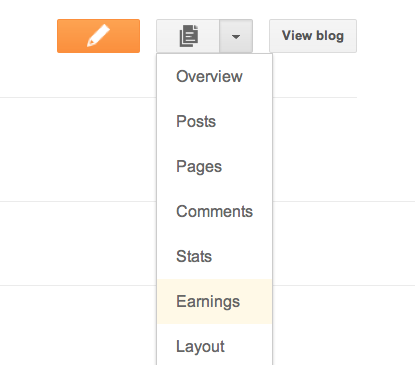
Once you have your blog set up and all the basic first content created, you are ready to begin making money. You need to know how to follow the proper steps to increase traffic to your site and to create revenue from your blog.
How do you make money from your blog? There are actually many
different ways of generating income through your blog. They may not all work for you. Some options include:
Donations
Contextual advertising
Selling advertising space
Affiliate programs
Product or service sales
You will need to consider each option to help you decide which one(s) will work best for you and how you plan to carry it out.
Donations
You can do donations with Paypal by putting a payment link or button on your blog. This makes it simple and easy for people to donate to your blog. Just keep in mind that if you expect people to donate, you need to be giving them something that they feel is worth it. There are also ways for you to set-up offline donations to your blog.
Google Adsense
Another way to make money from your blog is by using Google Adsense. This is called contextual advertising. Google has made this famous and it is now a very acceptable and common way of advertising which is offered by several companies, not just Google. When you use google to find a keyword, you will see ads that contain other keywords that are similar to the one that you were searching. Many people are inspired to click onto these related ads.
Sell advertising space.

Another way to bring money into your blog is by selling advertising space. Pheedo and Adbrite are two systems that allow people to run ads on your blog although; new providers are on the rise. You set a price and advertisers bid for a space. Of course, the first thing you need to do before selling advertising space is to prove that your blog is popular enough to attract readers that can see the ads.
One of the best ways to show exactly how popular your site is would be by keeping up with the amount of people that visit your blog. You should also make sure that you promote your blog in a way that it will rank high in the search engines. This is a vital step in making your blog popular.
Join Affiliate programs
Affiliate programs can make a great contribution to your blog. These programs help bloggers to earn extra money through the promotion of products from other people. This is a great way earn money because there are so many different types of products on the market for sale. ClixGalore, Commission Junction, Clickbank and LinkShare are the four major providers used, but there are others available.
Being a part of an affiliate program is easy. All you need to do is sign up. When you use one of the major providers you will have several different products on hand, but you can choose to use an individual product if you prefer. After this is done you simply use emails, forum posts, signatures and blog post to promote these products.
How to choose an affiliate program?
When you decide to use an affiliate program there are two things that you need to be concerned with. One is the amount of commission you receive and the other is Residuals. When you are looking at commission the highest percentage rate available is the best. Some even pay as much as seventy-five percent commissions. This is a really good rate.
Residuals are programs that continue to pay each time the person you introduced uses their services. Therefore, the longer the residuals last the more money you have a chance to make. Affiliate directories provide most of the information for their programs. These directories will tell the blogger how many sales have been made and explain the commission rate along with other statistics that will help you. Below is a list of affiliate directories that can be very helpful
ClickBank.com AssociatePrograms.com AffiliateMatch.com Refer-it.com AffiliatesDirectory.com
Another way for bloggers to bring in money is by making post; this service is offered by several companies. The four most well-known are Blogitive, BloggingAds, Blogsvertise and Payperpost.
Sign up for paid blogging
If you do not sign up with one of the services listed above, then you cannot get paid for blogging. This is a very simply process that involves supplying some basic information. This includes your name, Paypal address and email address. Of course, you will need to provide a link to your blog and you may be asked to place your blog in a category with a description. After visiting your blog it will be determined whether or not you meet the criteria of the service provider and their advertisers. It is recommended that you begin by using your most popular blog to sign up with to better ensure that you qualify. If its a new blog or one with little traffic you may not be accepted.
Paid blogging assignments
When your blog has been accepted by a company they will give you assignments based on the profile of your blog. It will be up to you to accept or decline the assignment. Different companies use different methods for their assignments. For instance, for some sites the blogger bids for the post. The winner is normally given a specific subject to post on. You will have a particular keyword or phase that you will need to use which is usually a product or company name. You will also be required to include a set number of links for the post.
The simplest assignments are the ones where the blog ad companies provide you with the text they want you to use. All you have to do is cut and paste. Others will ask you to write the post and you will be given anywhere from a day to one week to complete it. You will then be required to keep the blog post running for one year. These companies also have different methods for making payments. You could be paid immediately after completion, once a week or once a month depending on the company.
Sell your own product
There is one more way for bloggers to make money; it is by selling your own product. The best way to do this is to buy the rights to a product that you can claim as your own. You can then sell this product. You will find quite a few websites that offer this service. You can even repackage any private labels rights articles that you have purchased and sell these as a new product.
It is even possible for you to use the contents of your blog to create enough material to have something to sell. You would be able to use this content to create a book by the end of six months if you post to your blog on a daily basis. All you have to do is put all your updated information in book form by adding an introduction, resource list and of course a conclusion. Two great publishing sites you can use to sell the book would be TodayBooks.com and Lulu.com or if you prefer you can make your own PDF.
Create your own Cafepress shop
Have you ever thought about signing up with Cafepress and producing your own products for sale? Use the information from your keywords and other tools to know what people are interested in. You can then create mugs, T-shirts and other crafts to match these interests. Descriptive links and metatags need to be used to help the search engines find your blog and to visit your shop. This is a great way to bring new traffic to your blog and generate income.



























